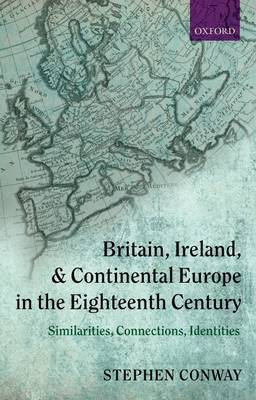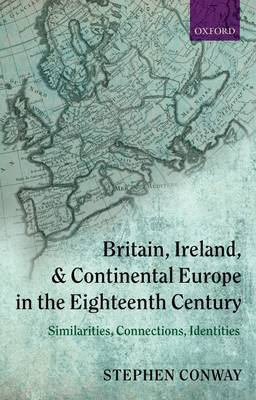
- Retrait gratuit dans votre magasin Club
- 7.000.000 titres dans notre catalogue
- Payer en toute sécurité
- Toujours un magasin près de chez vous
- Retrait gratuit dans votre magasin Club
- 7.000.0000 titres dans notre catalogue
- Payer en toute sécurité
- Toujours un magasin près de chez vous
Britain, Ireland, and Continental Europe in the Eighteenth Century
Similarities, Connections, Identities
Stephen Conway
Livre relié | Anglais
273,95 €
+ 547 points
Description
Britain's separateness from the rest of Europe is often taken as read. For generations, historians have presented Britain as exceptional and different. In recent years an emphasis on the Atlantic and imperial aspects of British history, and on the importance of the nation and national identity, has made Britain and Ireland seem even more distant from the neighbouring Continent. Stephen Conway's study offers a different perspective on eighteenth-century Britain and Ireland's relationship with continental Europe. It acknowledges areas of difference and distinctiveness, but points to areas of similarity. It accepts that both Britain and Ireland were part of an Atlantic and wider imperial world, but highlights their under-recognized connections with the rest of Europe. And, perhaps most ambitiously of all, it suggests that if the British and Irish thought and acted in national terms, they were also able, in the appropriate circumstances, to see themselves as Europeans. Other historians have opened up parts of this subject, presenting a more rounded picture than exceptionalist narratives allow, stressing convergence rather than divergence, establishing important connections and exploring their ramifications; but none have attempted such a panoramic view. Conway presents a case for our regarding eighteenth-century Britain and Ireland as integral parts of Europe, and for our appreciating that this was the perspective of many of the British and Irish at the time.
Spécifications
Parties prenantes
- Auteur(s) :
- Editeur:
Contenu
- Nombre de pages :
- 368
- Langue:
- Anglais
Caractéristiques
- EAN:
- 9780199210855
- Date de parution :
- 19-05-11
- Format:
- Livre relié
- Format numérique:
- Genaaid
- Dimensions :
- 157 mm x 236 mm
- Poids :
- 703 g

Les avis
Nous publions uniquement les avis qui respectent les conditions requises. Consultez nos conditions pour les avis.






